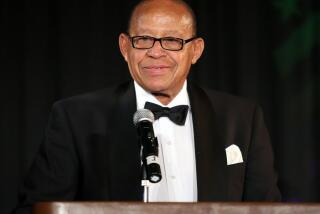A Standout in an Era of True Storytelling
- Share via
Theo Wilson was part of a generation of reporters who prized the art of storytelling.
Pre-television, they knew how to describe scenes for their readers. The best had a great eye for detail, a reverence for language, and an ability to put it all down in compelling stories, written in a hurry.
They took those rare skills into their social lives, telling stories of cops, lawyers, crooks, presidents, wars, murders, wild colleagues and whatever else they encountered in their daily adventures. If you couldn’t tell a story, you weren’t exactly an outcast but you were certainly on the fringe of the group.
Theo, who died Friday at the age of 78, was never on the fringe. She was a bright star of that generation, both as a raconteur and, most important, as a reporter who was considered by her peers to be the best at the difficult assignment of covering a big trial, a job she held for more than 30 years for the New York Daily News.
She told her stories in an engrossing book, “Headline Justice,” which is just hitting the stores. In it, she recalled some of America’s most famous trials, including Patty Hearst, Dr. Sam Sheppard, John DeLorean, Charlie Manson, Jack Ruby and Jean Smith, who was convicted of murdering Dr. Herman Tarnower.
After working on the book for years, Theo was enjoying some well-deserved acclaim for it. She was getting ready to appear on the Tom Snyder show Thursday when she suddenly fell ill and was taken to Cedars-Sinai Medical Center, where she died of a massive cerebral hemorrhage.
*
Last Tuesday, Theo and I had lunch so I could interview her about her book.
I picked her up at her Hollywood Hills home. Theo didn’t drive. She once took a cab hundreds of miles from Los Angeles to the Central Valley town of Chowchilla to cover the kidnapping of a school bus full of children.
She was a small, slender woman with the sparkling manner of someone many years younger. I could imagine her in her youth in the practically all-male Daily News city room. Or as she put it in her book: “Once somebody asked [city editor Harry Nichols]: ‘Does it bother you having Theo in here?’ He gave the question a moment’s thought. ‘Nah,’ he said, ‘now I know where all the guys are when I need them. They’re at her desk.’ ”
We drove to the Musso & Frank Grill on Hollywood Boulevard, a wood-paneled 78-year-old restaurant that reminded her of New York. We sat down in a booth by the wall, ordered, and, with some trepidation, I pulled out my notebook.
I was a little nervous about my notes because Theo took great pride in her note-taking skills. What if I misquoted her?
During trials, she took those notes on pads just four inches wide and six inches long, writing in a small hand, hearing all the words, watching all the courtroom action, not missing a thing. This skill is critical in the courtroom, where tape recorders are not allowed, and transcripts were too slow for the Daily News.
In her book, Theo recalled how she saw and heard everything during one of the biggest moments of her career, when Patty Hearst took the witness stand: “This is when you write down every word, every question from the lawyer, every answer from the defendant. But while you are scribbling away, you also have to keep looking up at the jurors, at the relatives and friends in the trial room to get their reactions.”
While taking down Hearst’s every word, she glanced up at the defendant’s father, Randolph Hearst, and noticed he “pressed his head into his hands so tightly that he left red fingerprints on his face.”
The art of description, Theo felt, is in decline. Rather than describe what they see and hear, today’s trial reporters call up lawyer-pundits and quote their views on what happened in the courtroom.
No wonder, she said, that the public is losing faith in the justice system.
*
Our lunch, however, was not a gloomy paean to the past. We’ve been friends a long time. She talked about the Daily News and the reporters she had worked with. I told a couple of stories about people we both knew.
Toward the end of lunch, Theo mentioned that a bookstore in the San Fernando Valley had put her name up in big letters on a sign advertising her forthcoming book signing. Her son, Delph, passed by it every day on his way to his law office, and he was mighty proud.
“My name’s in lights,” she laughed.
Right where it should be.
More to Read
Sign up for our Book Club newsletter
Get the latest news, events and more from the Los Angeles Times Book Club, and help us get L.A. reading and talking.
You may occasionally receive promotional content from the Los Angeles Times.









